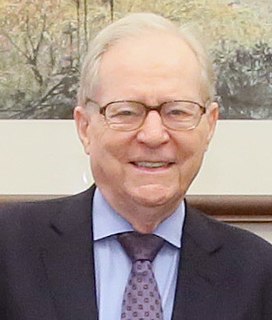
James Joseph Heckman is a Nobel Prize-winning American economist at the University of Chicago, where he is The Henry Schultz Distinguished Service Professor in Economics and the College; Professor at the Harris School of Public Policy; Director of the Center for the Economics of Human Development (CEHD); and Co-Director of Human Capital and Economic Opportunity (HCEO) Global Working Group. He is also Professor of Law at the Law School, a senior research fellow at the American Bar Foundation, and a research associate at the National Bureau of Economic Research. In 2000, Heckman shared the Nobel Memorial Prize in Economic Sciences with Daniel McFadden, for his pioneering work in econometrics and microeconomics. As of December 2020, according to RePEc, he is the second-most influential economist in the world.

Andrew Michael Spence is a Canadian-American economist and Nobel laureate.

The Institute for Fiscal Studies (IFS) is an economic research institute based in London, United Kingdom, which specialises in UK taxation and public policy. It produces both academic and policy-related findings.

Lars Peter Hansen is an American economist. He is the David Rockefeller Distinguished Service Professor of economics at the University of Chicago and a 2013 recipient of the Nobel Memorial Prize in Economics.

Kenneth George "Ken" Binmore, is an English mathematician, economist, and game theorist, a Professor Emeritus of Economics at University College London (UCL) and a Visiting Emeritus Professor of Economics at the University of Bristol. As a founder of modern economic theory of bargaining, he made important contributions to the foundations of game theory, experimental economics, evolutionary game theory and analytical philosophy. He took up economics after holding the Chair of Mathematics at the London School of Economics. The switch has put him at the forefront of developments in game theory. His other interests include political and moral philosophy, decision theory, and statistics. He has written over 100 scholarly papers and 14 books.

Christopher Albert Sims is an American econometrician and macroeconomist. He is currently the John J.F. Sherrerd '52 University Professor of Economics at Princeton University. Together with Thomas Sargent, he won the Nobel Memorial Prize in Economic Sciences in 2011. The award cited their "empirical research on cause and effect in the macroeconomy".

Sir Richard William Blundell CBE FBA is a British economist and econometrician.

Dale Weldeau Jorgenson was the Samuel W. Morris University Professor at Harvard University, teaching in the department of economics and John F. Kennedy School of Government. He served as chairman of the department of economics from 1994 to 1997.
Orazio Attanasio is an Italian economist and the Cowles Professor of Economics at Yale University. He was the Jeremy Bentham Chair of Economics at University College London. He graduated from the University of Bologna in 1982 and London School of Economics in 1988. He then went to teach at Stanford and was a National Fellow at Stanford's Hoover Institution and a visiting professor at the University of Chicago before arriving at University College London. Currently he is also a Research Director at the Institute for Fiscal Studies (IFS) in London, co-director of the Centre for the Evaluation of Development Policies at the Institute for Fiscal Studies, and a director of the ESRC Centre for the Microeconomic Analysis of Public Policy.
John Young Campbell is a British-American economist. He is the Morton L. and Carole S. Olshan Professor of Economics at the Department of Economics at Harvard University since 1994.
John Michael Van Reenen OBE is the Ronald Coase School Professor at the London School of Economics and the Gordon Y. Billiard Professor of Management and Economics at the Massachusetts Institute of Technology, where he is jointly appointed in the Department of Economics and the MIT Sloan School of Management. He is also an Associate in the Growth Research Programme at the Centre for Economic Performance. He was appointed an Officer of the Order of the British Empire (OBE) and received the Yrjö Jahnsson Award.
Lawrence Joseph Christiano is an American economist and researcher, who is a professor of economics at Northwestern University. He also holds the title of the Alfred W. Chase Chair in Business Institutions, and was the chairman of the Northwestern Department of Economics from 2016 to 2018. Prior to Northwestern, he taught at Carnegie Mellon University and the University of Chicago.
Manuel Arellano is a Spanish economist specialising in econometrics and empirical microeconomics. Together with Stephen Bond, he developed the Arellano–Bond estimator, a widely used GMM estimator for panel data. This estimator is based on the earlier article by Arellano's PhD supervisor, John Denis Sargan, and Alok Bhargava. RePEc lists the paper about the Arellano-Bond estimator as the most cited article in economics.

Alan Stewart Duncan is a British economist and econometrician.
Andrew Jonathan Hughes Hallett FRSE was a British economist. He was University Professor of Economics and Public Policy at George Mason University, Senior Research Fellow at Kings College and Honorary Professor of Economics at the University of St Andrews He was also a member of the Scottish Growth Commission.

Emi Nakamura is a Canadian-American economist. She is the Chancellor's Professor of Economics at University of California, Berkeley.
Xiaohong Chen is a Chinese economist who currently serves as the Malcolm K. Brachman Professor of Economics at Yale University. She is a fellow of the Econometric Society and a laureate of the China Economics Prize. As one of the leading experts in econometrics, her research focuses on econometric theory, Semi/nonparametric estimation and inference methods, Sieve methods, Nonlinear time series, and Semi/nonparametric models. She was elected to the American Academy of Arts and Sciences in 2019.
Imran Rasul is a professor of economics at the University College London, managing editor of the Journal of the European Economic Association, and co-director of the Centre for the Microeconomic Analysis of Public Policy at the Institute for Fiscal Studies. His research interests include labour, development and public economics and he is considered to be one of the leaders within social norms and capital economics.

The UCL Department of Economics is one of nine Departments and Institutes within the Faculty of Social and Historical Sciences at University College London. It is the oldest department of economics in England and is research-intensive, currently headed by Professor Antonio Guarino.

Anthony Lancaster is a British-American Bayesian econometrician. He is the Herbert H. Goldberger Professor emeritus at Brown University and has been a fellow of the Econometric Society since 1991.











